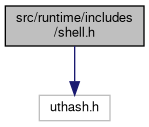Shell for running blockchain functions. More...
#include <uthash.h>
Go to the source code of this file.
Classes | |
| struct | Command |
| struct | CommandPool |
Macros | |
| #define | COMMAND_NAME_LEN 128 |
Functions | |
| size_t | arg_len (char **args) |
| void | str_to_buf (unsigned char *dest, char *hex_str, size_t dest_len, size_t src_len) |
| Converts a string of hex values to a buffer. More... | |
| int | shell_mine (char **args) |
| int | shell_build_tx (char **args) |
| int | shell_print_chain (char **args) |
| int | shell_print_block (char **args) |
| int | shell_exit (char **args) |
| int | shell_help (char **args) |
| char * | shell_read_line () |
| char ** | shell_tokenize (char *line) |
| int | shell_execute (size_t num_args, char **args) |
| void | shell_loop () |
| void | shell_init_globals () |
| void | shell_init_commands () |
| void | shell_init () |
Variables | |
| CommandPool * | shell_command_pool |
Detailed Description
Shell for running blockchain functions.
The shell allows users to interact with the local blockchain. Primary use case if for running a wallet, but currently also allows users to run a miner.
Commands are defined by a name, function, number of arguments and help string. A mapping of command name to the function to call when the command is executed is built on program start. After commands are initialized, the shell runs in a loop until the program is exited with CTRL+C, CTRL+D or exit. While in the loop, new lines of text are read, tokenized then executed.
Function Documentation
◆ str_to_buf()
| void str_to_buf | ( | unsigned char * | dest, |
| char * | hex_str, | ||
| size_t | dest_len, | ||
| size_t | src_len | ||
| ) |
Converts a string of hex values to a buffer.
Fills the destination with 0s and terminates early if either input is shorter than the other. This means that a string of hex values less than 64 characters long produces a buffer with a bunch of 0s on the end.
- Parameters
-
dest buffer to write to hex_str hex string to read from dest_len length of destination buffer src_len length of source string